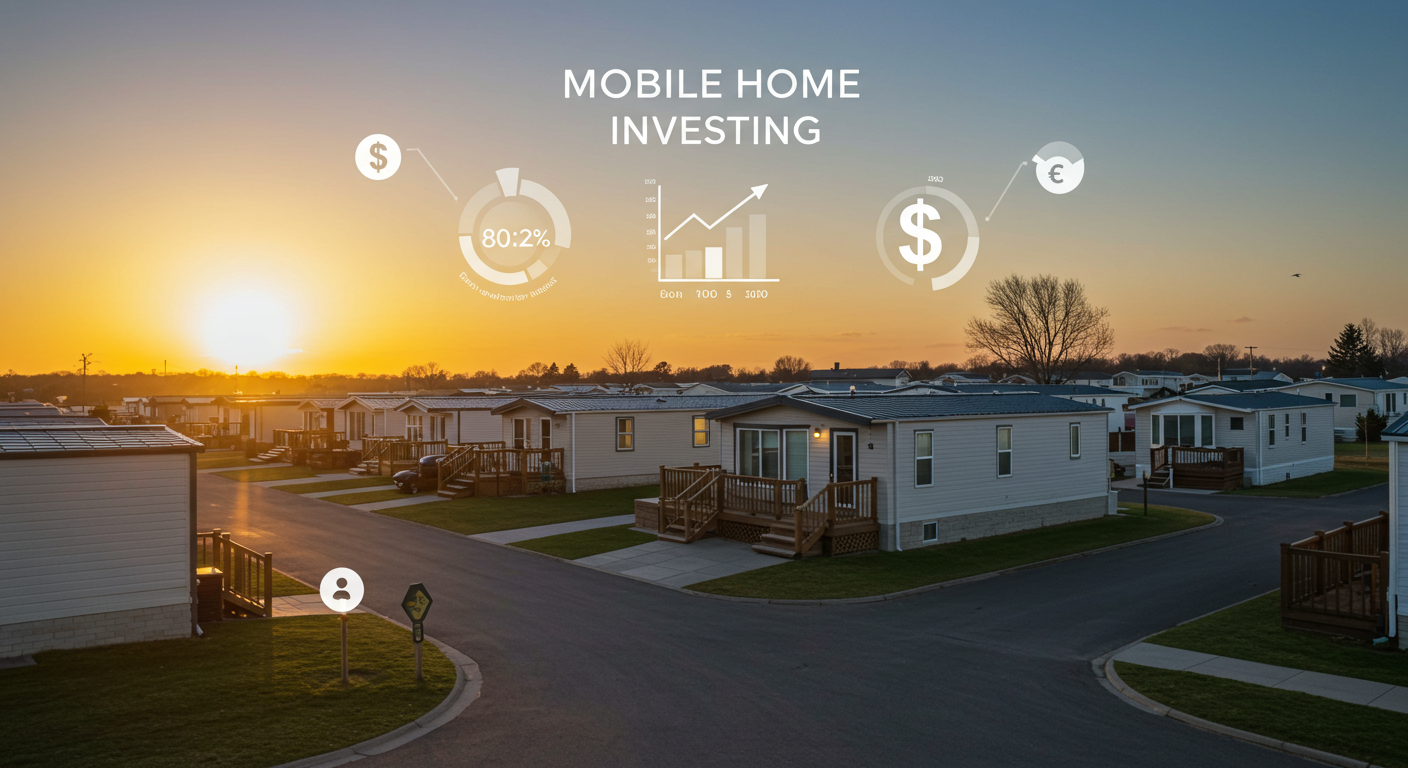Mobile home investing provides a low-cost entry into real estate, with initial investments often under $15,000 and monthly cash flow ranging from $300 to $1,000 per unit. You can leverage strategies like wholesaling, flipping, or renting to maximize returns, with potential profits doubling your investment. Over 22 million Americans live in mobile homes, ensuring steady demand. Seller financing and lower property taxes enhance profitability, while targeting distressed units minimizes renovation costs. Challenges like zoning laws and tenant management require careful planning. With urbanization driving demand, this market offers long-term stability. Explore further to uncover strategies for building a resilient mobile home portfolio.
Key Takeaways
- Mobile home investing offers lower upfront costs and high cash flow potential, with returns often doubling through flipping or wholesaling.
- Strategies include wholesaling, fixing and flipping, and building a network of cash buyers for quick turnover and minimized holding costs.
- Challenges include stigma, tenant management, and hidden costs like legal fees, but proactive maintenance and compliance mitigate risks.
- Market trends show growing demand due to urbanization, affordable housing needs, and increasing acceptance of mobile homes as permanent residences.
- Financing options are expanding, with loans for manufactured homes and government programs supporting mobile home park investments.
Benefits of Mobile Home Investing
While traditional real estate often demands significant upfront capital, mobile home investing offers a more accessible entry point, with initial costs frequently under $15,000. This lower barrier to entry makes it an attractive option for real estate investors seeking to diversify their portfolios without committing substantial resources. Mobile home investing allows you to generate passive income through rental properties, with monthly cash flow typically ranging between $300 to $1,000 per unit. This steady income stream can provide financial stability, especially during economic downturns, as the mobile home market has historically shown resilience. Approximately 22 million Americans, or 6% of the population, reside in mobile homes, ensuring consistent demand.
Additionally, mobile home investing offers high returns on investment. By flipping or wholesaling mobile homes, you can potentially double your initial purchase cost, provided you execute your strategy effectively. Mobile home parks further amplify these benefits by creating multiple income streams. You can lease land to homeowners while maintaining lower property taxes and insurance costs compared to traditional multi-family units. This dual-income model enhances your cash flow and reduces financial risk.
For real estate investors, mobile home investing combines affordability, scalability, and profitability. It’s a practical way to build wealth without the complexities of traditional real estate, making it an ideal choice for those looking to maximize returns while minimizing upfront costs. Utilizing property analysis tools can further enhance your investment strategy by providing detailed insights into market trends and property performance.
Key Strategies for Mobile Home Investments
Wholesaling mobile homes lets you secure properties under contract and sell the rights for $5,000 to $10,000 per deal, requiring minimal upfront capital. Fixing and flipping distressed units can yield returns of 2x or more on your investment after renovations. Offering seller financing creates passive income streams, with potential earnings exceeding $400 per month per unit for years.
Wholesaling Mobile Homes
How can you profit from mobile home investments without significant upfront capital? Wholesaling mobile homes offers a low-risk entry point for mobile home investors. By identifying undervalued properties and negotiating contracts with motivated sellers, you can secure deals without needing substantial funds. Once under contract, you sell the agreement to cash buyers, earning a profit margin typically ranging from $2,000 to $10,000 per transaction. Success hinges on locating sellers in distress, such as those facing foreclosure or needing quick sales, to secure favorable terms. Building a robust network of cash buyers is critical, as it guarantees quick turnover and minimizes holding costs. Effective marketing strategies, like online listings and targeted outreach, help you generate consistent leads. Investing in mobile homes through wholesaling requires minimal capital but demands strong negotiation skills and market knowledge. By focusing on these strategies, you can create a steady income stream while avoiding the risks associated with traditional property ownership. Utilizing online platforms like invstg or DealMachine can streamline lead generation and enhance your wholesaling efficiency.
Fixing and Flipping
Fixing and flipping mobile homes can deliver substantial returns, often doubling or more on your initial investment, due to their lower acquisition costs compared to traditional real estate. To make money in this niche, focus on mobile homes needing cosmetic repairs rather than structural overhauls. This minimizes renovation costs and maximizes profit margins. Investors should also analyze local demand and pricing trends to set competitive selling prices, ensuring quick sales to cash buyers. Building a reliable team for repairs is essential, as outsourcing allows you to scale your business and source more deals efficiently. Conducting a rental market analysis can further refine your pricing strategy and ensure your mobile home investments align with local demand and affordability trends.
| Step | Key Action | Outcome |
|---|---|---|
| 1. Acquisition | Buy undervalued mobile homes | Low entry cost, high ROI potential |
| 2. Renovation | Focus on cosmetic repairs | Minimize costs, maximize appeal |
| 3. Pricing | Analyze local market trends | Set competitive, profitable prices |
| 4. Sale | Target cash buyers | Quick turnover, reduced holding time |
Seller Financing Options
While traditional financing can limit buyer accessibility, seller financing opens up opportunities for investors to expand their market and generate consistent cash flow. By acting as the bank, you can offer flexible payment options to buyers, potentially earning $400+ per month per mobile home. This approach lowers upfront costs for buyers, making owning mobile homes more attainable and increasing your pool of potential purchasers. Lease-to-own agreements, a common seller financing strategy, allow you to structure higher monthly payments to cover your investment, though you must account for risks like tenant default. Negotiating terms such as down payments and interest rates guarantees mutual benefits, creating a win-win scenario in mobile home parks and real estate investing. Ethical structuring of agreements is critical—transparency and clear expectations protect both parties and help avoid legal complications. Seller financing not only diversifies your investment portfolio but also positions you to capitalize on the growing demand for affordable housing solutions. By leveraging this strategy, you can maximize returns while providing accessible pathways to homeownership. Additionally, seller financing enables rapid property transfers, allowing transactions to conclude in days rather than weeks or months, which can significantly enhance your investment efficiency.
Financial Considerations and Cash Flow

When investing in mobile homes, understanding the financial considerations and cash flow potential is critical to building a profitable portfolio. Mobile home park investing offers a unique opportunity to generate steady cash flow through monthly rental income and seller financing. Entry costs typically range from $5,000 to $50,000, making it an accessible option for new investors. By focusing on cash flow, you can aim to recover your initial investment within 6 to 12 months, depending on your strategy.
Monthly rental income from mobile homes can range between $300 to $1,000 per unit, depending on factors like location and condition. This steady income stream provides a reliable foundation for your portfolio. Additionally, seller financing can amplify your cash flow, as it allows you to sell mobile homes with structured payment plans, often yielding $400 or more per month per unit. This approach not only generates passive income but also attracts buyers who may not qualify for traditional financing.
Diversifying your income streams is key to maximizing cash flow. Combining cash sales, monthly payments, and rentals creates a balanced portfolio that mitigates risk and guarantees consistent returns. For example, while cash sales provide immediate liquidity, seller financing and rentals offer long-term stability. By leveraging these strategies, you can build a sustainable cash flow model that supports your financial goals in mobile home park investing. Consider exploring down payment assistance programs to further reduce upfront costs and enhance your investment potential.
Overcoming Challenges in Mobile Home Investing
Although mobile home investing offers significant cash flow potential, it comes with unique challenges that require strategic planning and proactive management. One major hurdle is overcoming the stigma associated with mobile homes. You can address this by educating potential buyers and investors about the affordability and demand for mobile housing. With approximately 22 million Americans residing in mobile homes, the market is substantial, but perception often lags behind reality. Highlighting the benefits of mobile homes as affordable rental property can shift perspectives and attract more interest.
Tenant management is another vital area. To reduce default rates, conduct thorough background checks and financial assessments. This guarantees you’re renting to responsible tenants, minimizing risks associated with personal property investments. Additionally, maintenance responsibilities differ from traditional rentals. Regular inspections and proactive property care are essential to maintain the condition and appeal of your mobile homes, guaranteeing long-term tenant satisfaction.
Hidden costs, such as legal fees and infrastructure maintenance for mobile home parks, can erode profitability if not accounted for. Careful budgeting and planning are necessary to navigate these expenses. By anticipating these challenges and implementing strategic solutions, you can maximize returns and build a sustainable mobile home investment portfolio. Addressing these issues head-on guarantees your rental property remains a viable and profitable asset in the competitive real estate market. Utilizing tools like a Long Term Rental Calculator can help you accurately assess cash flow and ROI, ensuring your investment decisions are data-driven and financially sound.
Legal and Regulatory Insights
 Zoning laws greatly influence mobile home investments by restricting placement locations, directly affecting property value and investment potential. You’ll need specialized insurance coverage for mobile homes, as standard policies often exclude risks tied to their unique construction and mobility. Understanding these regulations guarantees compliance and minimizes financial exposure in your investment strategy.
Zoning laws greatly influence mobile home investments by restricting placement locations, directly affecting property value and investment potential. You’ll need specialized insurance coverage for mobile homes, as standard policies often exclude risks tied to their unique construction and mobility. Understanding these regulations guarantees compliance and minimizes financial exposure in your investment strategy.
Zoning Laws Impact
Understanding zoning laws is critical for mobile home investors, as these regulations directly influence where and how properties can be developed or utilized. Zoning laws vary considerably by state and locality, often restricting mobile homes to designated areas or specific classifications like mobile home parks. Non-compliance can lead to fines, forced removal, or legal disputes, making due diligence essential. Investors must verify whether a property is zoned for mobile homes, assess density limits, and verify infrastructure requirements for utilities and road access are met. Failure to align with zoning laws can derail your investment strategy and increase financial risks.
- Designated Zones: Many jurisdictions require mobile homes to be placed in specific areas, limiting development opportunities.
- Density Limits: Zoning classifications often dictate how many units can occupy a space, impacting profitability.
- Infrastructure Requirements: Local laws may mandate utilities, road access, or other infrastructure, adding to development costs.
- Rental Restrictions: Some areas prohibit using mobile homes as rentals, affecting your revenue model.
Insurance Requirements Overview
When investing in mobile homes, securing the right insurance is a legal and financial necessity, as standard homeowners’ policies often fall short in addressing the unique risks these properties face. Mobile home insurance is specifically designed to cover the structure, personal belongings, and liability, providing thorough protection. Insurance premiums for mobile homes typically range from $300 to $1,000 annually, depending on factors like location, age, and coverage limits. Many states require mobile home insurance as part of the title registration process, emphasizing its importance for financial security.
To minimize risks, insurers often mandate that mobile homes meet specific safety standards, such as proper anchoring to withstand wind and weather-related damages. Failure to comply can lead to higher premiums or denied claims. Below is a breakdown of key considerations:
| Factor | Impact on Premiums | Compliance Requirement |
|---|---|---|
| Location | High-risk areas = higher premiums | Must meet local safety standards |
| Age of Home | Older homes = higher premiums | Regular inspections required |
| Coverage Limits | Higher limits = higher premiums | Adequate liability coverage |
| Anchoring System | Non-compliance = higher premiums | Must meet anchoring standards |
Understanding these factors guarantees you secure the right coverage while adhering to legal and safety standards.
Building a Mobile Home Investment Portfolio
Although building a mobile home investment portfolio requires careful planning, it’s an accessible strategy for investors with limited capital, as entry costs often start under $15,000. Mobile homes offer a unique opportunity to generate passive income through rental agreements, with average monthly rents ranging from $300 to $1,000. This cash flow can help you recover your initial investment within 16 months, making it a viable option for those seeking affordable housing investments. By diversifying your portfolio to include both individual mobile homes and mobile home parks, you can create multiple income streams that cater to different demographic needs.
To maximize your returns, consider these strategies:
- Leverage seller financing: Act as the bank and earn $400+ per month per unit in cash flow by offering financing options to buyers.
- Focus on affordable housing demand: Target areas with high demand for low-cost housing, as mobile homes often serve as a primary solution for affordable living.
- Acquire multiple units: Start small with one or two mobile homes and gradually expand your portfolio to reduce risk and increase income potential.
- Understand local markets: Research local regulations and market conditions to guarantee your investments align with demand and legal requirements.
Market Trends and Future Opportunities

As the demand for affordable housing continues to surge, the mobile home market is positioned for substantial growth, with over 22 million Americans already living in mobile homes. This trend is fueled by rising urbanization and escalating construction costs for traditional homes, making manufactured homes a cost-effective alternative. You’ll find that mobile homes are increasingly appealing to buyers seeking affordability without sacrificing quality, as modern designs and amenities bridge the gap between traditional and manufactured homes.
The real estate market for mobile home parks is also expanding, driven by investors diversifying their portfolios. With approximately 62% of mobile home residents planning to stay for over a decade, you can expect stable occupancy rates and long-term returns. This stability makes owning mobile home parks a lucrative opportunity, particularly as rental demand in the affordable housing sector grows.
Stigma surrounding mobile homes is diminishing, as more investors and buyers recognize their value. You’ll notice that manufactured homes are no longer seen as temporary housing but as viable, long-term solutions. This shift in perception opens doors for future opportunities, including increased financing options and higher resale values.
Conclusion
So, you’ve discovered mobile home investing—the “underdog” of real estate that boasts cash flow margins rivaling luxury properties. While others chase “glamorous” markets, you’ve unearthed a goldmine yielding ROI rates that’ll make your spreadsheet sing. Sure, it’s not a penthouse overlooking Central Park, but who needs that when your portfolio’s compounding at 15% annually? Keep crunching the numbers, and let the naysayers laugh—they’ll be crying when your cash flow’s the envy of their “traditional” investments.




